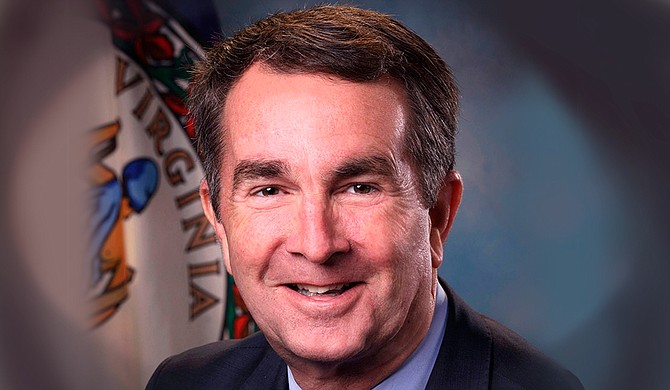"The most troubling thing about the scandal around Virginia Gov. Ralph Northam isn't his racist yearbook photo. It's not his continually shifting story. It's not even the fact that he considered moonwalking during a news conference about the incident. The most disturbing element, to me, is the number of people defending his behavior and demanding that he be given a second chance." Photo courtesy State of Virginia Photo by State of Virginia
The most troubling thing about the scandal around Virginia Gov. Ralph Northam isn't his racist yearbook photo. It's not his continually shifting story. It's not even the fact that he considered moonwalking during a news conference about the incident. The most disturbing element, to me, is the number of people defending his behavior and demanding that he be given a second chance.
"But he's progressive!"
"At least he's pro-choice!"
We cannot use appeals to his (relatively moderate) political record to palliate the offensiveness of his actions. Such statements ultimately translate to an admission that some people's rights matter more than others'. It doesn't matter that Northam wore blackface or posed in the robes of a terrorist organization, because he wants to do something I support! This is a betrayal of the principles of intersectionality, the idea that no one's human rights are secure unless everyone's are.
It's important to note that the would-be redeemers of Northam's legacy reveal one critical piece of information about themselves: They identify more with him than with victims of white supremacy. Feeling sorry for Northam, lamenting a "rush to judgment" in his case, or insisting that his past doesn't reflect on his present perpetuates our country's long history of prioritizing abusers' feelings and careers over the suffering and lives of those harmed by their actions.
Of course, the Northam controversy is a small aspect of a much larger problem. Rehabilitating racists is a long-standing national tradition. One hundred and fifty years after Reconstruction, we've hardly changed our approach to justice or reparations. Back then, if a slaveholder who had taken up arms to defend white supremacy simply swore allegiance to the other side's flag, he was forgiven. His white supremacy was not called into question, because both sides shared it. Therefore, he was allowed to continue exploiting, threatening and dehumanizing his victims with impunity.
Today, if a politician is confronted with evidence of their racism, they simply apologize or attempt to deflect blame in order to stay in office, despite having demonstrated that they don't view all of their constituents as fully human or deserving of equal respect. (If the politician in question is Cindy Hyde-Smith or Steve King, they don't even have to apologize.) An extramarital affair or campaign finance irregularity seems to do more damage to a politician's career than blatant white supremacy.
Not surprisingly, this societal attitude is reflected in the policy these elected officials create. Is it any wonder that they have shown little willingness to change a system that disproportionately polices, imprisons, exploits and profits off of marginalized people? These leaders grovel for contributions from corporations that oppress their own constituents, while upholding American exceptionalism and U.S. imperialism—concepts deeply rooted in white supremacy.
Worse yet, they attempt to dictate the way we interpret the world by insisting that those who stay poor because of inadequate wages, mass incarceration, underfunded schools and other societal barriers are in fact lazy or unmotivated or lacking in the "personal responsibility" to change their circumstances, while those who have been afforded every privilege and opportunity are somehow hardworking, deserving and morally superior. They have perfected the art of the dog whistle.
But we cannot begin to adequately address these deep-seated injustices while we remain more invested in rescuing reputations than in ensuring that human rights are respected. That requires a frank and painful analysis of the ways in which we inadvertently and reflexively preserve white supremacy.
Fellow white people: white supremacy should be a dealbreaker. The fact that we, too, have participated in it or benefited from it or gone along with it before does not somehow make it all right now. Consciousness of past complicity in white supremacy should make us more intentional about preventing future injustices, not more accepting of them.
The fact that Northam has been unable or unwilling to go through this hard reckoning makes him unfit to serve. Defending him will only result in the normalization of his actions and make it harder to move forward.
More like this story
- Virginia Governor Announces Special Session on Gun Control
- Hood: Judge Tate Reeves for 'Rebel Flags,' Not Frat's College Blackface
- Virginia, New Jersey Reject 'Trumpism' as Dems Score Major Victories
- Two Mississippi Governor Candidates: No Blackface or KKK Robes
- Pro-gun Rally by Thousands in Virginia Ends Peacefully




Comments
Use the comment form below to begin a discussion about this content.
comments powered by Disqus